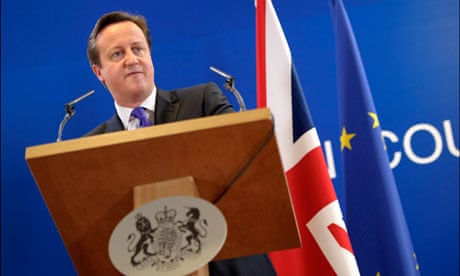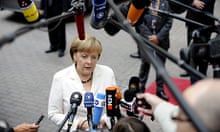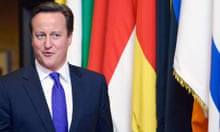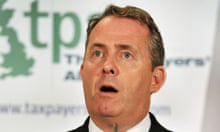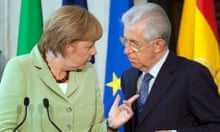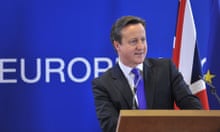David Cameron placed himself on a collision course with the Tory right when he mounted a passionate defence of Britain's membership of the EU and rejected out of hand an "in or out" referendum.
Buoyed by a successful Brussels summit, in which Britain moved to block plans to extend a eurozone banking union across the EU, the prime minister hailed his "practical eurosceptic" approach.
Speaking at the end of the summit, the prime minister said: "For those of us who are practical eurosceptics, who know there is a real benefit from being engaged but are frustrated by some of the ways the relationship works, I see lots of reasons to say the argument is going our direction."
The prime minister offered his most enthusiastic endorsement of Britain's EU membership after No 10 said that major progress was made in Brussels on two fronts:
Eurozone leaders stabilised the single currency in the early hours of Friday morning by agreeing to allow the new permanent bailout fund to recapitalise banks directly. Cameron said this came close to the "big bazooka" he called for last year. "I have been to enough of these summits to know that Rome, Europe – none of these things was built in a day. There'll be other steps required. But for the first time in some time, we have steps taken which the markets will see are trying to get ahead of the game," Cameron said.
Britain resisted plans that could have allowed a single supervisor to oversee banks across the EU. The prime minister managed to remove three paragraphs from the summit conclusions on this.
Cameron also secured "explicit commitments" to ensure that the EU's single market, which applies to all 27 members of the EU, will not be undermined by the new eurozone governance arrangements. Britain has been concerned that the 17 members of the eurozone could act as a group and impose their will on the single market, whose rules are decided by "qualified majority voting" in which no country can wield a veto.
Flushed by what No 10 was hailing as one of his greatest EU negotiating triumphs, the prime minister challenged Tory MPs demanding an "in or out" referendum on Britain's EU membership.
"I completely understand why some people want an in/out referendum. Some people just want to get out: stop the bus, I want to get off.
"But I don't share that view. That is not the right thing to do. The problem with an in/out referendum is that it only gives people those two choices. You can stay either in with all the status quo or you can get out. Most people in Britain want a government that stands up and fights within Europe and gets the things we want in Europe; that changes some of the relationships we have in Europe. I have made some small steps forward."
The prime minister's rejection of an in/our out referendum is a blow to Tory MPs, such as Douglas Carswell, who wants to leave the EU. But the prime minister did not completely close the door on a separate referendum once the plans for the eurozone has been finalised.
A group of nearly 100 Tory MPs called on Thursday for a referendum to be held in the next parliament "on the nature of our relationship with the European Union". It is understood that the prime minister and chancellor are assessing whether they could hold a referendum to approve the concessions they are likely to demand from fellow EU leaders in exchange for endorsing the changes in the eurozone.
Downing Street is aiming to push for the repatriation of social and employment laws, as outlined in the Tory election manifesto. Cameron said: "This is a developing situation."
Douglas Alexander, the shadow foreign secretary, gave a cautious welcome to the summit. "Although rescuing the euro must be the focus for eurozone leaders, reforming it must be the ambition – and vital and complex negotiations lie ahead if deeper fiscal and monetary union within the eurozone is to be achieved. David Cameron has a heavy responsibility in the months ahead to ensure that Britain's interests, and the interests of the single market, are protected."
Nigel Farage, the leader of the UK Independence Party, who hopes to beat the Tories into second place in the 2014 European parliamentary elections, said: "David Cameron has made a huge mistake by explicitly ruling out a referendum. This prime minister is determined to keep us in the clutches of the EU, and many more of his voters will come to UKIP."
